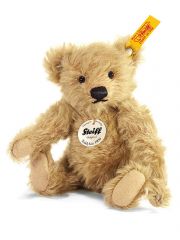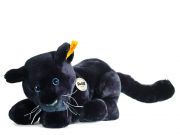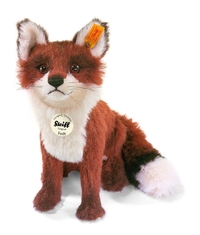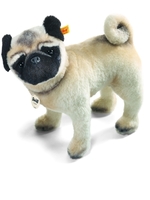Odd Jobs: Teddy Bear Tester
 Saturday, February 26, 2011 at 8:00
Saturday, February 26, 2011 at 8:00  So many fascinating jobs out there...ones we dream of having, ones we hope to avoid. And others that suprise us by their existence.
So many fascinating jobs out there...ones we dream of having, ones we hope to avoid. And others that suprise us by their existence.
Last year Der Spiegel interviewed German toymaker Steiff's director of quality control, a man identified as Mr. Krebs. I have to wonder if this is an alias, as his name means Mr. Cancer. A strangely appropriate name for a man whose job is to mutilate and destroy sweet, soft little teddy bears.
Der Spiegel writer Michaela Schiessel describes his job as:
In the land of stuffed animals, there is conflict twice a week. That's when the designers at famed German stuffed toy maker Steiff are required to present their latest creations to the director of quality control, a man named Mr. Krebs. He is completely immune to the heartbreakingly sweet faces of teddy bears, cuddly baby rabbits and cute longhaired guinea pigs. The furry toys' baby-like faces do not trigger any paternal feelings in Krebs.
Instead, his feelings toward the toys are driven by scientific curiosity. When Krebs sees a stuffed animal, his first thought is to burn it, drown it and wring its neck. He chars them, covers them with saliva and tears at their heads. He rubs acid into their fur, roasts them under UV light and tests the way they respond to all sorts of chemicals.
Only when a test bear has survived Krebs' onslaught is it permitted to become a Steiff animal. And when that happens, it gets the company's trademark button in its ear -- a medal for bravery, if you will -- at company headquarters in the town of Giengen in southwestern Germany.
In the land of stuffed animals, there is conflict twice a week. That's when the designers at famed German stuffed toy maker Steiff are required to present their latest creations to the director of quality control, a man named Mr. Krebs. He is completely immune to the heartbreakingly sweet faces of teddy bears, cuddly baby rabbits and cute longhaired guinea pigs. The furry toys' baby-like faces do not trigger any paternal feelings in Krebs.
Instead, his feelings toward the toys are driven by scientific curiosity. When Krebs sees a stuffed animal, his first thought is to burn it, drown it and wring its neck. He chars them, covers them with saliva and tears at their heads. He rubs acid into their fur, roasts them under UV light and tests the way they respond to all sorts of chemicals.
 Amusing as the job may be, Steiff is a prime example of German focus on quality - and also the willingness to pay high prices for quality. Selling poor quality goods (except where they're marketed as low cost alternatives) is a guaranteed strategy to lose your customers here. Though departments stores and supermarkets have found a place here, there still are numerous small specialty stores where you go to get advice from the experts. Just in a 2 block radius from my apartment, we have a couple of model train stores, a knife store, a store selling small personal appliances (razors, toothbrushes, etc), a wig store, and a sewing store. Additionally, when you visit a large sports store, the salespeople are experts in their areas - they actually know the products and can advise you on your purchase. If you can get someone's attention....
Amusing as the job may be, Steiff is a prime example of German focus on quality - and also the willingness to pay high prices for quality. Selling poor quality goods (except where they're marketed as low cost alternatives) is a guaranteed strategy to lose your customers here. Though departments stores and supermarkets have found a place here, there still are numerous small specialty stores where you go to get advice from the experts. Just in a 2 block radius from my apartment, we have a couple of model train stores, a knife store, a store selling small personal appliances (razors, toothbrushes, etc), a wig store, and a sewing store. Additionally, when you visit a large sports store, the salespeople are experts in their areas - they actually know the products and can advise you on your purchase. If you can get someone's attention....
When looking at sofas in a large furniture store, we were initially frustrated that there was only one salesperson for a small group of sofas and that no other salesperson could help us. Knowing that most service personnel in Germany work on salary, rather than commission, we knew it was not a financial issue. We later learned that each section had a salesperson who was an expert on those products and could answer any questions - therefore, the others could not help outside their areas. Still a bit frustrating to get help, but the system does make sense.
 Back to Steiff....We've already learned about the famous Reinheitsgebot, or Beer Purity Law, stating that beer can only contain water, barley, and hops. Steiff has its own Reinheitsgebot, as a 10 point Purity Law governing the production of their plush toys!
Back to Steiff....We've already learned about the famous Reinheitsgebot, or Beer Purity Law, stating that beer can only contain water, barley, and hops. Steiff has its own Reinheitsgebot, as a 10 point Purity Law governing the production of their plush toys!
 And the price/quality tradeoff? Well, these cute little guys are tested and have various quality certifications....and you're going to pay $50-150 or more for a teddy bear ($235 for the 12 inch Pug). They are super soft and the other animals are adorable, but it was a bit of a shock to me to see those prices on a stuffed animal! However, that's where we can see one big general difference between German and American cultures. Whether it's clothing, furniture, electronics, or teddy bears...Germans buy fewer items, but of higher quality. As Americans, we're used to low priced, almost disposable goods. We buy more impulsively, and we don't expect to keep things for years. Germans will plan purchases, investigate quality and options, and most often will save up for a purchase rather than buying it on credit. And they demand quality and longevity out of major purchases. I'm still often shocke by the prices here, but I'm starting to understand the system.
And the price/quality tradeoff? Well, these cute little guys are tested and have various quality certifications....and you're going to pay $50-150 or more for a teddy bear ($235 for the 12 inch Pug). They are super soft and the other animals are adorable, but it was a bit of a shock to me to see those prices on a stuffed animal! However, that's where we can see one big general difference between German and American cultures. Whether it's clothing, furniture, electronics, or teddy bears...Germans buy fewer items, but of higher quality. As Americans, we're used to low priced, almost disposable goods. We buy more impulsively, and we don't expect to keep things for years. Germans will plan purchases, investigate quality and options, and most often will save up for a purchase rather than buying it on credit. And they demand quality and longevity out of major purchases. I'm still often shocke by the prices here, but I'm starting to understand the system.
 Germany & German Culture tagged
Germany & German Culture tagged  Germany,
Germany,  odd jobs,
odd jobs,  shopping,
shopping,  shopping in Germany ...
shopping in Germany ...  Print Article
Print Article  Email Article
Email Article 



